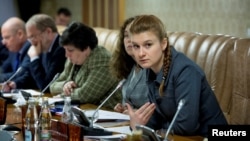By her early 20s, Maria Butina appeared to have a budding political career and a mini furniture empire in her remote Siberian hometown. Then she abandoned both to pursue her passion for gun rights, and, prosecutors say, to spy on the United States.
Butina, 29, faced a hearing Wednesday in Washington on accusations she worked as a foreign agent, representing a new generation of Russian operatives seeking a long-term U.S. foothold. Her lawyer says she did nothing wrong.
“It’s psychosis. A witch hunt,” her father, Valery Butin, was quoted as saying Wednesday by the Altapress website in her hometown of Barnaul.
Prosecutors see spy
U.S. prosecutors suggest Butina used her gun-lobbying efforts to infiltrate the NRA and the Republican Party, both during the 2016 presidential campaign and after Donald Trump’s election.
U.S. federal prosecutors detailed extensive private Twitter conversations and other discussions between Butina and a senior Russian official about her activities in the United States.
The Russian official is believed to be Alexander Torshin, deputy head of the Russian Central Bank and a target of U.S. sanctions since April. He and the Central Bank didn’t respond to requests for comment about Butina’s arrest.
Kremlin sees 'ideal victim'
Kremlin-backed Russian television calls her the “ideal victim” of anti-Russian hysteria in the U.S. The Russian Embassy in Washington says Butina hasn’t been able to meet with consular representatives since her Sunday arrest.
From her provincial beginnings, Russian media accounts say, Butina displayed remarkable ambition, political savvy and an overt love of weapons.
That carried her out of the Siberian steppe to Moscow, where she befriended a well-placed senator and founded a gun-rights group.
Move to US
Her ambitions didn’t stop at Russia’s borders. She traveled to gun shows and right-wing events from the Freedomfest in Las Vegas to a National Rifle Association meeting in Indianapolis, according to her own social media posts. Along the way, she met the governor of Wisconsin, and gave speeches at a high school and university in South Dakota.
“There is nothing new in this case,” the Russian ambassador to the U.S., Anatoly Antonov, said Wednesday, according to Russian news agencies. “The U.S. intelligence services are hunting for Russia’s citizens not only in the U.S. but in other countries too.”
Before her move to the U.S., Butina studied politics at Altai State University and the School of Real Politics in Barnaul, and opened a furniture store that she grew into a network, according to Altapress and other local news sites.
Butina was elected to the local Public Chamber, an advisory body that acts as a go-between between local officials and the public.
She ran for a spot on the nationwide Public Chamber; she didn’t get it but she did make contacts in Moscow and moved to the capital, where she founded gun-rights group Right to Bear Arms.
Among those she met in Moscow was political expert Andrei Kolyadin, who used her as an interpreter when he attended a National Prayer Breakfast in the U.S. and said he spoke with her just before her arrest about the World Cup, held in Russia.
“She is an extremely energetic person with plenty of ideas,” he said in an interview with Russia’s Interfax news agency. He insisted she wasn’t working in intelligence.
Conspiracy charge
Butina is charged with conspiracy to act as an unregistered agent of the Russian government, suspected of gathering intelligence on American officials and political organizations and working to establish back-channel lines of communications for the Kremlin.
Her lawyer, Robert Driscoll, called the allegations overblown and said prosecutors had criminalized mundane networking opportunities. Driscoll said Butina is not an agent of the Russian Federation but is instead in the U.S. on a student visa, graduating from American University with a master’s degree in international relations.
The former head of the School of Real Politics in Barnaul questioned the accusations against her — especially the timing of her arrest, announced just after Trump held a summit with Russian President Vladimir Putin.
“What’s the interest in Maria? She has been studying there two or three years. Why didn’t they suspect her a year ago? Why exactly on the day of the visit with Trump is this needed?” Konstantin Emeshin asked on state-run Rossiya 1 television.
Answering his own question, he continued: “So that there is a reason for information to spread, so it can be twisted around.”




